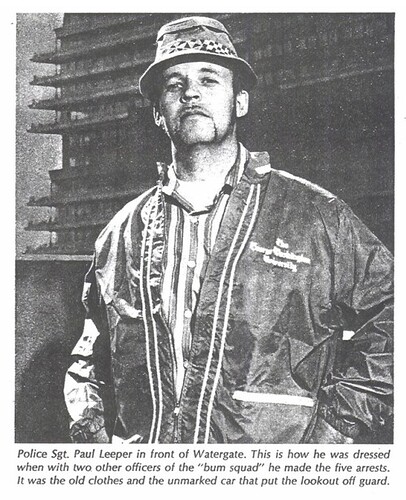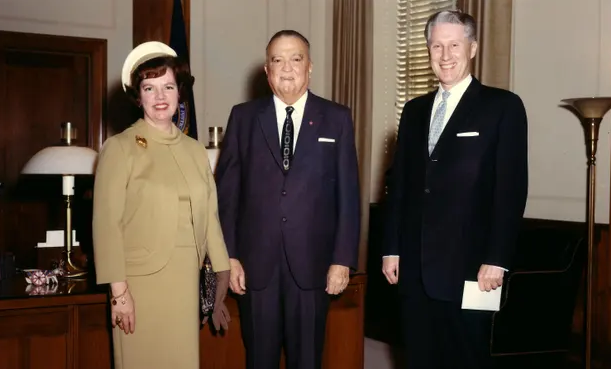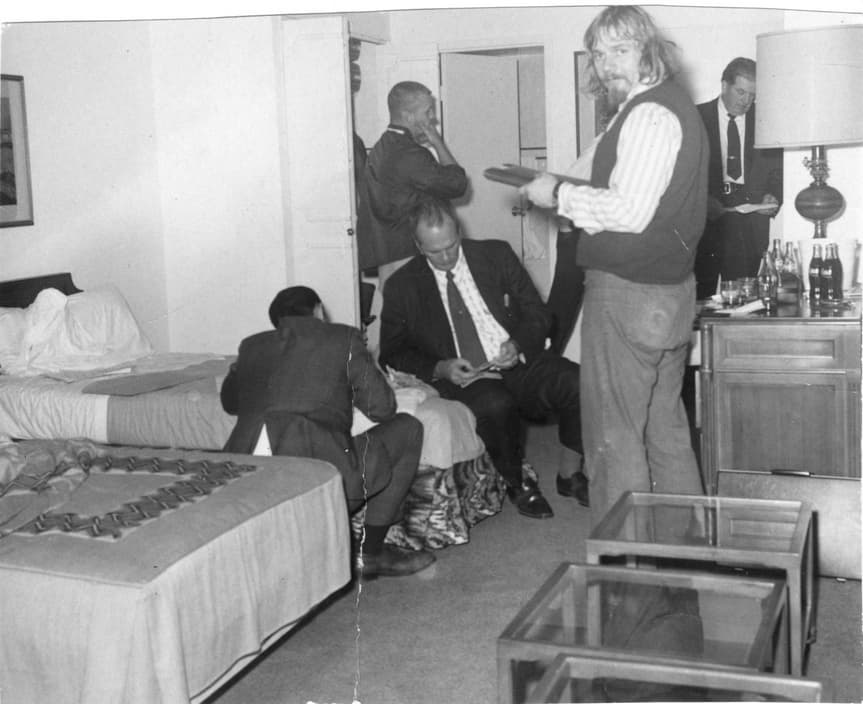"John Mitchell Told Me to Tell You…"
Hugh Sloan is almost the caricature of what you’d imagine a senior government accountant to look like. Think Calvin’s dad, from Calvin and Hobbes. Sloan had been logging 6-day weeks in the spring and summer of 1972 in his duties as Treasurer of the Committee to Re-elect.
Sloan had gone into work early on Saturday morning the 17th, and was surprised to discover that he wasn’t the first person at the Committee offices in DC. He observed G. Gordon Liddy – whom Sloan knew as a lawyer engaged in gathering intel on the opposition – scurrying back and forth between Liddy’s office and a room with a large, industrial paper shredder.
The two men met in the hall as Sloan went to see if anyone had started coffee yet that morning. Liddy took Sloan aside and told the accountant that an operation had gone badly earlier that morning, and that he (Liddy) was pretty sure he was going to get fired for it. “Do you know when Magruder will be coming in?” Liddy asked.
Sloan informed Liddy that the senior campaign staff – Committee chairman and former Attorney General John Mitchell, his deputy at CREEP, Jeb Magruder, and senior consultants Fred LaRue and Robert Mardian – were all in California for a fundraiser that evening with John Wayne and Jimmy Stewart.
Liddy waited until late morning and phoned Magruder in California just as the campaign’s second-in-command was taking breakfast. “Jeb, there’s a missile base near you. I need you to go there and get a secure line and call me back.”
Magruder, like many on the campaign committee, had grown weary of Liddy’s nonsensical “Let’s play spies” idiocy, informed Gordon that he wasn’t going 50 miles to a missile base. He’d call Liddy back shortly, from a pay phone.
When Magruder called Liddy back about 10 minutes later, he heard some truly terrible news, from a truly, monumentally stupid human being. “Jeb, I think I fucked something up.” Liddy confessed to the campaign deputy head that an “operation” had gone badly, and that five of his people had been arrested. “I think we’re fine on four of them. They won’t talk, and they can’t be traced to us.” Magruded exhaled. Whew. That was close.
“But there’s the fifth guy,” Liddy continued. “Jeb, I used someone from CRP on this job.”
Magruder was stunned. “WHAT? Gordon, how many times did we tell you…” his voice trailed off. History doesn’t record it, but you can imagine Magruder face palming or furiously rubbing his temples at this point. “Who is it?”
“McCord.”
“Jesus.” Magruder told Liddy he’d call back in 20 minutes.
When Liddy got the call back, Magruder had a plan of action for him. “Gordon, call Kleindienst and tell him to get all five guys released, pronto. If he can’t do all five, at least tell him to get McCord the hell out of there. Make sure he knows that he needs to at least get McCord sprung before he can be traced back to us.”
(In case you missed that, that’s called “Obstruction of Justice.”)
Richard Kleindienst had been the official US Attorney General for all of 7 days, having finally been confirmed by the senate to take over for John Mitchell (for whom he’d been the deputy AG) and having “interim” removed from his title. On Saturday June 17, he’d booked a foursome for golf at the prestigious DC country club where he was a member. While taking in lunch before the tenth hole, he noticed Liddy out in the hallway outside the club cafeteria, frantically motioning for him.
Kleindienst had met Liddy once or twice, and had the same impression of the guy that many did. He thought Liddy was probably an insane, somewhat stupid narcissist. But he couldn’t have the Committee intel gathering lawyer causing a scene at the club, so Kleindienst headed into the hall to talk with him.
Liddy, almost breathless with excitement, told the new AG that an political intelligence gathering op had gone wrong. “John Mitchell told me to tell you to get the five guys who got arrested out of jail, as soon as you can.”
Kleindienst had maybe been born at night, but had not been born the previous night. He knew bullshit when he smelled it, and it was coming off Liddy in waves. “Gordon? John Mitchell knows how to reach me at all times. If he wanted me to do something like that, he’d have called.”
In fact, Kleindienst motioned a waiter and got a phone brought over from the country club and called Henry Peterson, the head of the US Attorney’s office in DC’s criminal investigation unit. Peterson quickly briefed the Attorney General on what was known so far in the Watergate burglary. “Henry,” Kleindienst said, scowling at Liddy, “Make sure those five burglars are treated no differently than any other suspects for a similar crime would be. Do you hear me?” Peterson acknowledged the request.
Kleindienst then dismissed Liddy. “I have a round of golf to finish, Gordon.”


